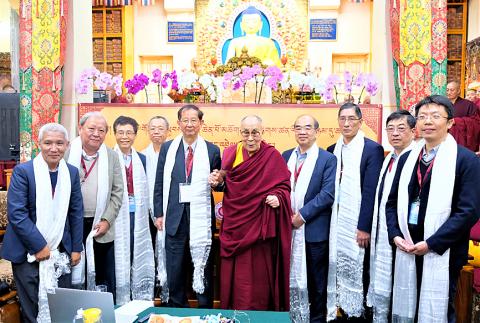The Dalai Lama on the final day of a three-day dialogue with scientists in India yesterday spoke about the possibility of holding a similar meeting in Taiwan.
Hopefully, there will be many more such dialogues between science and Buddhism, and more scientists in ethnically Chinese communities could be invited, he said, adding that he hoped such an event could be held in Taiwan.
“We welcome you to visit Taiwan,” Taiwanese Nobel laureate Lee Yuan-tseh (李遠哲), who led a group of Taiwanese scientists to the event in Dharamsala, told the Dalai Lama.

Photo: CNA
The scientists arrived in Himachal Pradesh on Wednesday for a meeting with the Dalai Lama to discuss quantum mechanics in Buddhism, expand the scope of scientific studies to include the exploration of the inner mind and inculcate compassion in scientific research.
Academia Sinica members Wu Maw-kuen (吳茂昆), Lee Shih-chang (李世昌), Lee Ting-kuo (李定國) and Mou Chung-yuan (牟中原) were among the Taiwanese scientists at the event.
At its conclusion yesterday, the Dalai Lama put khata — ceremonial scarfs in Tibetan Buddhism — around the shoulders of the participants as a token of gratitude.
The Dalai Lama said he preferred talking to scientists from Chinese communities after 30 years of experience with Western scientists revealed beliefs revolving around a “creator.”
He spoke about a professor from Tsinghua University in Beijing who said he would seek to invite the Dalai Lama to scientific conferences to attend “not as the Dalai Lama, but as a scientist.”
Despite the event’s title — “Dialogue between His Holiness the 14th Dalai Lama and Chinese scientists on the quantum effect” — no scientists from China attended, as “there is no freedom in China,” the Dalai Lama said, adding that he could “therefore only invite Taiwanese scientists.”
“It is time that people tried to understand their inner selves, as the wisdom of Buddhist writings should not just be contained in books, but applied,” he said.
“Otherwise, the work of Buddhists would be reduced to praying, presiding over rituals and transferring merits,” he said.

NATIONAL SECURITY THREAT: An official said that Guan Guan’s comments had gone beyond the threshold of free speech, as she advocated for the destruction of the ROC China-born media influencer Guan Guan’s (關關) residency permit has been revoked for repeatedly posting pro-China content that threatens national security, the National Immigration Agency said yesterday. Guan Guan has said many controversial things in her videos posted to Douyin (抖音), including “the red flag will soon be painted all over Taiwan” and “Taiwan is an inseparable part of China,” while expressing hope for expedited “reunification.” The agency received multiple reports alleging that Guan Guan had advocated for armed reunification last year. After investigating, the agency last month issued a notice requiring her to appear and account for her actions. Guan Guan appeared as required,

A strong cold air mass is expected to arrive tonight, bringing a change in weather and a drop in temperature, the Central Weather Administration (CWA) said. The coldest time would be early on Thursday morning, with temperatures in some areas dipping as low as 8°C, it said. Daytime highs yesterday were 22°C to 24°C in northern and eastern Taiwan, and about 25°C to 28°C in the central and southern regions, it said. However, nighttime lows would dip to about 15°C to 16°C in central and northern Taiwan as well as the northeast, and 17°C to 19°C elsewhere, it said. Tropical Storm Nokaen, currently

PAPERS, PLEASE: The gang exploited the high value of the passports, selling them at inflated prices to Chinese buyers, who would treat them as ‘invisibility cloaks’ The Yilan District Court has handed four members of a syndicate prison terms ranging from one year and two months to two years and two months for their involvement in a scheme to purchase Taiwanese passports and resell them abroad at a massive markup. A Chinese human smuggling syndicate purchased Taiwanese passports through local criminal networks, exploiting the passports’ visa-free travel privileges to turn a profit of more than 20 times the original price, the court said. Such criminal organizations enable people to impersonate Taiwanese when entering and exiting Taiwan and other countries, undermining social order and the credibility of the nation’s

‘SALAMI-SLICING’: Beijing’s ‘gray zone’ tactics around the Pratas Islands have been slowly intensifying, with the PLA testing Taiwan’s responses and limits, an expert said The Ministry of National Defense yesterday condemned an intrusion by a Chinese drone into the airspace of the Pratas Islands (Dongsha Islands, 東沙群島) as a serious disruption of regional peace. The ministry said it detected the Chinese surveillance and reconnaissance drone entering the southwestern parts of Taiwan’s air defense identification zone early yesterday, and it approached the Pratas Islands at 5:41am. The ministry said it immediately notified the garrison stationed in the area to enhance aerial surveillance and alert levels, and the drone was detected in the islands’ territorial airspace at 5:44am, maintaining an altitude outside the effective range of air-defense weaponry. Following